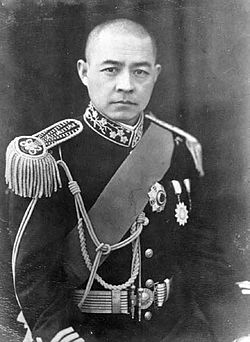Zhang Zizhong
Zhang Zizhong | |
|---|---|
 Zhang Zizhong | |
| Native name | 張自忠 |
| Born | August 11, 1891 Linqing, Shandong, Qing dynasty |
| Died | May 16, 1940 (aged 48) Yicheng, Hubei |
| Allegiance | |
| Service | |
| Years of service | 1914–1940 |
| Rank | |
| Unit |
|
| Commands | 33rd Army Group † Third Division |
| Battles / wars | Battle of Taierzhuang, Battle of Wuhan, Battle of Yichang † |
| Awards | Order of Blue Sky and White Sun |

Zhang Zizhong (traditional Chinese: 張自忠; simplified Chinese: 张自忠; pinyin: Zhāng Zìzhōng; Wade–Giles: Chang Tzu-chung; August 11, 1891 – May 16, 1940) was a general of the Chinese National Revolutionary Army (NRA) during the Second Sino-Japanese War. Born in Linqing, Shandong, he was the highest-ranked officer and the only Army group commander of the NRA to die in the war. He was killed-in-action during the Battle of Yichang after refusing to retreat from the front lines. He showed great valor in the field and was regarded as one of the most valiant and respectable Chinese generals by the Imperial Japanese Army during the Second Sino-Japanese War. Because he was lieutenant general with the effective rank of full general at the time of his death, and was posthumously promoted to full general, he was also one of the highest-ranked Allied officers killed in action in World War II.[1] His mausoleum is situated in Beibei District, Chongqing. There are roads named after him in Shanghai, Beijing, Tianjin and Wuhan.
Career timeline
- 1911: Studied law in Tianjin
- 1914: Assigned to the 20th Army Division near Fengtian (present day Shenyang) as platoon leader
- 1935–1936: Chairman of the Government of Chahar Province
- 1937: Mayor of Tianjin
- 1937: General Officer Commanding 38th Division
- 1937–1940: General Officer Commanding LIX Corps
- 1938: General Officer commanding the 27th Army
- 1939: Commander in Chief Right Flank Army 5th War Area
- 1939–1940: Commander in Chief 33rd Army Group
- 1940: Killed in Action at Mount Chang near Yichang, Hubei
- 1940: Posthumous promotion to Full General[2]
Death
General Zhang Zizhong, commander of the eight divisions that constituted the Chinese 33rd Army Group, was killed at approximately 4:00 p.m. on May 16, 1940, in fighting at Shilichangshan (‘Ten li mountain’) near Nanguadian in Northern Hubei. The battle was one engagement of the Zaoyang-Yichang campaign that rumbled through late spring of that year. Surrounded by the Japanese, his forces had refused either to retreat or to surrender. In the ensuing hand-to-hand combat, General Zhang had been wounded seven times in all, by grenade, bullet, and finally by bayonet. The victorious Japanese realized Zhang's identity only when a major discovered, in the left breast pocket of his blood-soaked yellow uniform, a fine gold pen engraved with his name. The major quickly summoned senior officers; they ordered a stretcher brought and the body was carried away from the battlefield. (This was observed, through half-opened eyes, by Zhang's long-time associate, the Chinese major Ma Xiaotang, who lay nearby, bleeding from a bayonet wound, and who later gasped out the story to Chinese as he died).[3]
See also
- Military history of China
- History of the Republic of China
- Kuomintang
- Second Sino-Japanese War
- World War II
- Marco Polo Bridge Incident
- Battle of Tai'erzhuang
- Battle of Wuhan
References
- ^ Along with Royal Navy Admiral Tom Phillips, killed in the Sinking of Prince of Wales and Repulse in 1941, Red Army Army Generals Nikolai Vatutin, mortally wounded by the Ukrainian Insurgent Army in 1944, and Ivan Chernyakhovsky, killed by artillery fire in the campaign leading to the battle of Königsberg in 1945, and US Army Lt. Gen. Lesley J. McNair, killed by friendly fire in France on July 25, 1944.
- ^ 1940年國民政府頒佈了褒恤令和追晉張自忠將軍為陸軍上將令「故陸軍上將銜陸軍中將張自忠追晉為陸軍上將。此令。中華民國二十九年七月七日。」 Executive Order issued by the Republic of China on July 7th, 1940 - "Post Posthumous promotion of Lieutenant General Zhang Zizhong to Full General, effects immediately. Date."
- ^ Waldron, A. (1996). China's New Remembering of World War II: The Case of Zhang Zizhong. Modern Asian Studies, 30(4), 945-978. doi:10.1017/S0026749X00016851
Further reading
- Arthur Waldron. "China's New Remembering of World War II: The Case of Zhang Zizhong". Modern Asian Studies 30, 4 (1996): 945–978.
External links
- A memorial site for Zhang Zizhong (in Simplified Chinese)
- A commemorative site in English for Zhang Zizhong
